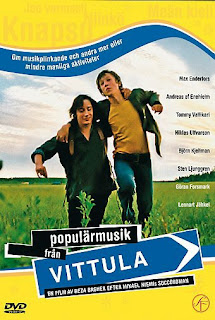 Voy a explotar
Voy a explotar (2008) aka I'm gonna explode
Dir:Gerardo Naranjo
Country: Mexico
4 wins & 2 nominations
See more »
Voy a Explotar (I’m Gonna Explode) is the contemporary Mexican teenage Pierrot le Fou. It knows this, and it wants you to know it, and it doesn’t care if this makes you hate it on principle. The third feature by Gerardo Naranjo (director of Drama/Mex, co-writer and star of Azazel Jacobs‘ The GoodTimeskid), it’s the rare love letter to influence that’s infused with enough personal style and sentiment to transform the stolen into something thrilling and moving.
15 year-old Maru (Maria Deschamps) is a prep school bad girl with a mangy mane of hair and, apparently, a drinking problem. When spoiled little rich boy son of a right-wing politician Roman (Juan Pablo de Santiago) gets kicked out of his school and transfers to Maru’s, he introduces himself via faking his own hanging at a talent show. The girl is instantly besotted. “He exists, but I also made him up,” she writes in a letter to a friend which doubles as internal monologue. “The best part is that he’s angry.” Roman is equally smitten, and soon the pair are scheming to run away together.
Or so they want their parents to think; really, they’re camped out in a tent on the roof of Roman’s father’s mansion. Maru’s hysterical mother and sister come over to the house to become part of the rescue effort––which, under the oversight of Roman’s distant dad, consists mainly of drinking tequila and waiting for clues to come to him. With a stolen cell phone, Roman calls daddy’s security detail with false leads to get the grown ups out of the house so that he and Maru can crawl downstairs and collect provisions. It’s only when the pair decide to finally leave home for real that their saga starts to hew to the traditional tropes of love-on-the-run.
Explotar is so blatantly indebted to Pierrot le Fou that it’s tempting to play Count the References –– here Maru clomps around singing “I don’t know what to do!” There the screen fills with her notebook-scrawled ephemera about romantic destiny! But Naranjo has made Maru more than the beautiful mystery that embodies the typical Godard woman. This girl is a loud-mouthed firecracker who vacillates between unguarded passion for Roman and brittle rejection of his advances. In cutting off her hair to become Roman’s “twin”, Maru reveals that her attraction to Roman is actually a kind of jealousy. Deluded as she is about most elements of the real world and grown-up life, she knows her power over Roman ends the moment she becomes a “put outer.” even if she puts out in the name of love, and there’s a resentment there. She’s the kind of realistically conflicted girl almost never seen on screen.
The sex scenes between the two teenagers are surprisingly sexy, not because of what you see but because there isn’t much to see at all. Though the nudity is borderline frank in that Euro, “teenage breasts=freedom” sort of way, it’s not overtly titillating so much as it’s recognizably real, from the nervous twitching leading up to it to the lack of assuredness that runs throughout. Maru and Roman’s romance is brittle and tentative at first, but then the floodgates open, at which point, with an almost fin de siecle spirit, it gushes.
The peak of Maru and Roman’s relationship coincides with the puncture of their invincibility. Once they cement that they are one another’s “perfect accomplice,” as Maru puts it, the time comes to pay the bill for their rebellion. This is the essence of teenage romance ––the first love will be the last love–– and thus, it’s something we’ve seen on screen before. What feels unique, and genuinely tragic, about Explode’s denouement is not that shit gets violent and people get hurt, but that Maru and Roman, like most kids, clearly never really wanted to get in trouble at all. Mouthy and lazy but ultimately uninterested in any kind of criminal nihilism that would take them too far away from the womb of parental-funded modern comforts, Maru and Roman went looking for a Ferris Bueller-style charmed but temporary time-out from mundane responsibility, and end up bumbling into Bonnie and Clyde. In these climes of quirky indie romantic lessons learned, the punishment of starry-eyed delusion feels not only refreshing, but almost like a corrective with political implications.
 തട്ടുംമ്പോരത്തപ്പന്(2010)
തട്ടുംമ്പോരത്തപ്പന്(2010)































